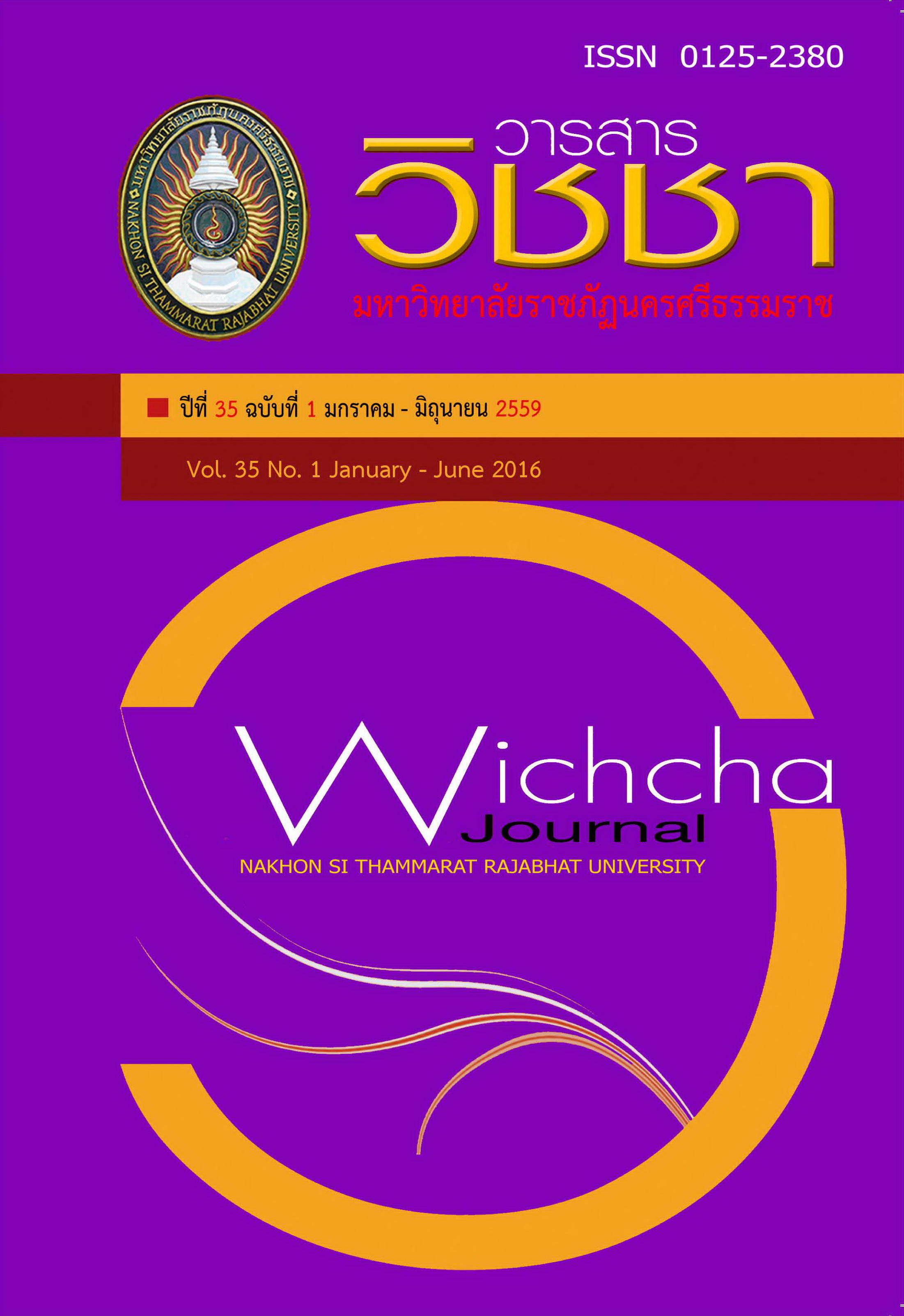เชื้อเพลิงแก๊สซิฟิเคชันจากวัสดุเหลือใช้ทางการเกษตร เพื่อผลิตไฟฟ้า: อีกทางเลือกของพลังงานทดแทนของภาคใต้ Gasification Fuel from Agricultural Residues to Generate Electrical Power: Alternative Energy for the South of Thailand
Main Article Content
Abstract
ปัจจุบันปัญหาด้านพลังงานเป็นปัญหาใหญ่ในการพัฒนาประเทศ โดยเฉพาะภาคใต้ของประเทศไทยที่มีโอกาสขาดแคลนพลังงานมากที่สุด ทางภาคใต้มีพืชเศรษฐกิจที่สำคัญคือ ยางพารา และปาล์มน้ำมัน ซึ่งพืชทั้งสองชนิดนี้เมื่อหมดอายุการเก็บเกี่ยวผลผลิตสามารถนำไปผลิตเป็นพลังงานทดแทนในรูปแบบของชีวมวล บทความนี้ได้ทบทวนเอกสารและเสนอแนวทางแก้ไขปัญหาดังกล่าว สำหรับการผลิตชีวมวลเป็นพลังงานไฟฟ้าที่เหมาะกับการนำไปใช้ในธุรกิจขนาดเล็กมีขนาดกำลังผลิตไฟฟ้าไม่เกิน 1 MW เพื่อเป็นการลดต้นทุนทางพลังงานนั้น การเปลี่ยนสภาพชีวมวลโดยกระบวนการแก๊สซิฟิเคชัน มีความเหมาะสมและคุ้มค่าต่อการลงทุนมากที่สุด และเตาแก๊สซิฟายเออร์ชนิดไหลลงมีความเหมาะสมสำหรับเครื่องกำเนิดไฟฟ้าขนาดเล็ก เมื่อแก๊สผ่านชุดปรับปรุงคุณภาพก็สามารถใช้เป็นเชื้อเพลิงของเครื่องยนต์ชนิดแก๊สโซลีนและดีเซลได้ ผลที่ได้จากการศึกษานี้สามารถนำไปต่อยอดพัฒนาเพื่อแก้ปัญหาวิกฤตพลังงานของภาคใต้ต่อไป
Nowadays, energy problem has become a major issue for country development, especially in the southern part of Thailand which has the highest risk of having energy shortage. There are two important economic crops in the south of Thailand; latex tree and oil palm. These two crops, when reaching the end of their harvesting ages, can be used to produce alternative energy in the form of biomass.
Therefore, this article reviewed various studies and proposed a solution for generating electricity that suitable for small business with electricity generating capacity less than 1 MW. The proposed method would reduce the energy cost for the business. The investigation showed that gasification of the biomass was the most suitable and worthwhile. Furthermore, gasifier chamber in the form of downdraft gasifier was suited for small scale electricity generator. And, with an addition of gas reconditioning process, the resulting gas could be applied to gasoline
and diesel engines. These findings could provide development guidelines for solving future energy crisis in the southern part of Thailand.
Article Details
เนื้อหาและข้อมูลในบทความที่ลงตีพิมพ์ในวารสารวิชชา มหาวิทยาลัยราชภัฏนครศรีธรรมราช ถือเป็นข้อคิดเห็นและความรับผิดชอบของผู้เขียนบทความโดยตรง ซึ่งกองบรรณาธิการวารสารไม่จำเป็นต้องเห็นด้วยหรือร่วมรับผิดชอบใด ๆ
บทความ ข้อมูล เนื้อหา รูปภาพ ฯลฯ ที่ได้รับการตีพิมพ์ในวารสารวิชชา มหาวิทยาลัยราชภัฏนครศรีธรรมราช ถือเป็นลิขสิทธ์ของวารสารวิชชา มหาวิทยาลัยราชภัฏนครศรีธรรมราช หากบุคคลหรือหน่วยงานใดต้องการนำข้อมูลทั้งหมดหรือส่วนหนึ่งส่วนใดไปเผยแพร่ต่อหรือเพื่อการกระทำการใด ๆ จะต้องได้รับอนุญาตเป็นลายลักษณ์อักษรจากวารสารวิชชา มหาวิทยาลัยราชภัฏนครศรีธรรมราชก่อนเท่านั้น
The content and information in the article published in Wichcha journal Nakhon Si Thammarat Rajabhat University, It is the opinion and responsibility of the author of the article. The editorial journals do not need to agree. Or share any responsibility.


